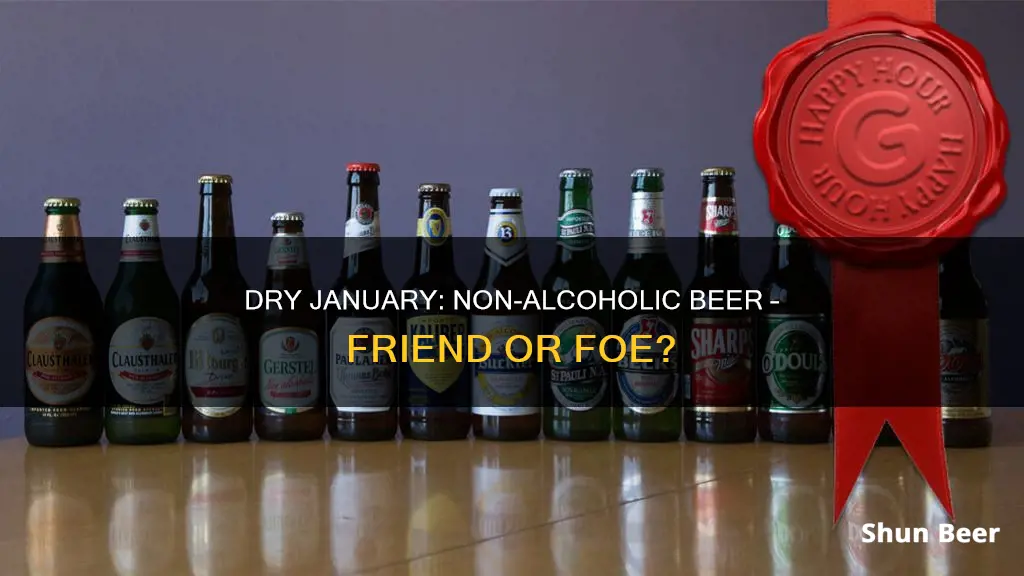
Dry January is a month-long abstinence from alcohol, typically done in January, that has gained popularity over the years. The challenge was started in 2012 by Alcohol Change UK, a British charity, to ditch the hangover, reduce the waistline and save some serious money by giving up alcohol for 31 days. Since then, millions of people have taken part in the challenge, with 35% of American adults participating in 2022.
The question remains: can you drink non-alcoholic beer during this period? The answer is yes. Non-alcoholic beer, defined as beer with an alcohol content of less than 0.5% ABV, is allowed during Dry January. In fact, non-alcoholic beverages, including beer, wine, and spirits, have seen a boom in the market, with many celebrities investing in non-alcoholic drink companies.
| Characteristics | Values |
|---|---|
| Alcohol content | Non-alcoholic beer typically contains up to 0.5% ABV, while 0% ABV beers may contain trace amounts of alcohol. |
| Health benefits | Non-alcoholic beer can be a healthier alternative to alcoholic drinks, improving sleep quality, energy levels, mood, and overall health. |
| Social situations | Non-alcoholic beer provides an option for social drinkers who want to cut back on alcohol consumption without giving it up completely. |
| Taste | The taste of non-alcoholic beer is similar to regular beer, making it a viable alternative for those who enjoy the flavor. |
| Availability | The market for non-alcoholic beer is growing, with a variety of craft and commercial options available. |
| Cravings | Non-alcoholic beer may help manage cravings for alcoholic drinks during Dry January. |
What You'll Learn

Non-alcoholic beer is a valid option for Dry January
Dry January is a popular annual trend where people abstain from consuming alcohol for the 31 days of January. It was started in 2012 by Alcohol Change UK, and has since grown in popularity, with 35% of American adults participating in 2022.
The reasons for taking part in Dry January vary, but the main motivation is to improve one's health. Excessive alcohol intake is linked to an increased risk of several health conditions, including certain cancers, liver disease, high blood pressure, cardiovascular disease, and stroke. Therefore, abstaining from alcohol for a month can be a great way to reset and focus on health goals.
For those who enjoy the taste of beer, non-alcoholic beer is a valid option during Dry January. It allows people to continue enjoying the flavour and ritual of drinking beer without consuming alcohol. The non-alcoholic beer market has grown significantly in recent years, with many companies offering craft non-alcoholic beers that rival normal-strength beers in terms of flavour, aroma, and mouthfeel.
Some people may question the validity of non-alcoholic beer during Dry January, as these beverages typically contain a small amount of alcohol, up to 0.5% ABV. However, it is important to note that even 0% ABV beers may contain trace amounts of alcohol due to detection equipment limitations. Additionally, many everyday foods naturally contain similar or higher amounts of alcohol, such as ripe bananas and burger rolls.
Non-alcoholic beer provides an option for those who want to cut back on their alcohol consumption without giving up the taste and experience of drinking beer. It is a valid choice for Dry January, as it allows people to reset their relationship with alcohol while still enjoying the sensory aspects of beer.
However, it is important to note that non-alcoholic beer may not be suitable for everyone. Research has found that it can provide sensory cues that trigger thoughts of drinking for people with alcohol addiction, potentially leading to a relapse. Therefore, it is crucial to consider one's individual circumstances and make an informed decision about whether non-alcoholic beer is the right choice for Dry January.
Wet Paper Towel on Beer: Does This Method Work?
You may want to see also

The benefits of non-alcoholic beer
While Dry January is a great opportunity to reset and step away from alcohol, it can be challenging to abstain for a whole month. Non-alcoholic beer is a great alternative, and you may be surprised to know that it has many health benefits. Here are some of the advantages of non-alcoholic beer:
Post-Exercise Recovery
The sodium in non-alcoholic beer aids in post-exercise recovery. The fluids and carbohydrates it contains also help your body to recuperate after strenuous exercise.
Rehydration
Non-alcoholic beer is better at rehydrating the body than alcoholic beer, which has a diuretic effect and can leave you feeling dehydrated. Studies have shown that non-alcoholic beer maintains hydration better than water.
Cardiovascular Health
Non-alcoholic beer is believed to improve cardiovascular health. This is likely due to the polyphenols it contains, such as polyphenol xanthohumol, which is derived from hops. It can help to reduce blood pressure, inflammation, and homocysteine levels.
Sleep
The hops in non-alcoholic beer have a sedative effect and can improve sleep patterns. Hops increase the activity of the neurotransmitter gamma-aminobutyric acid (GABA). When GABA levels increase, neural activity decreases, allowing the brain to relax. Studies have shown that drinking non-alcoholic beer can help people fall asleep faster and improve overall sleep quality.
Stress and Anxiety
Consuming non-alcoholic beer has been found to reduce feelings of anxiety and stress. Experimental studies have shown that drinking non-alcoholic beer in the evening for a period of two weeks led to lower self-reported levels of anxiety and stress among participants. This effect was also confirmed by physical tests.
Bone Density and Osteoporosis
Non-alcoholic beer contains high amounts of silicon, which is necessary for boosting collagen production in the body. This, in turn, leads to healthier bones, blood vessels, hair, skin, and nails. Therefore, non-alcoholic beer may play an essential role in preventing osteoporosis.
Copper Metabolism
One of the non-alcohol components of beer promotes better copper metabolism, helping to reduce the severity of a copper deficiency, which can cause joint pain, anemia, and weak bones.
Breast Milk Production
Non-alcoholic beer may stimulate the secretion of prolactin, a hormone that enhances breast milk production. The barley in beer contains a polysaccharide that boosts milk flow. Additionally, drinking non-alcoholic beer may increase antioxidants in breast milk and decrease compounds related to oxidative stress in the mother's body.
Beer and Army Uniforms: What's the Official Stance?
You may want to see also

The challenges of finding non-alcoholic beer
The non-alcoholic (NA) beer market has witnessed a surge in recent years, reflecting a broader societal trend towards health and wellness. NA beer, typically containing less than 0.5% alcohol by volume, has transcended its niche status to become a mainstream option. While it was initially targeted at consumers who abstained from alcohol for health, religious, or personal reasons, the demographic has broadened to include health-conscious individuals, athletes, and those participating in the sober curious movement. The NA beer sector is more than a passing movement and represents a fundamental shift in consumer preferences and lifestyle choices. However, there are challenges to consider.
One challenge is creating NA beers that retain the complexity and depth of traditional craft beers. Brewers are experimenting with various techniques to remove or prevent alcohol formation while maintaining the rich, complex flavours of craft beer, such as arrested fermentation, vacuum distillation, and reverse osmosis. Another challenge is serving NA beer on draught, as it is inherently different from traditional alcohol-containing styles. Alcohol limits the survival and growth of pathogenic bacteria, but there is limited research on bacterial growth and survival in non-alcohol beer. This presents potential human health risks, especially if the beer is served from a poorly maintained long draw draught system.
NA-only brands face the challenge of standing out in a crowded market. Many embrace the wellness vibe to differentiate themselves, while others focus on sports and nutrition. Some NA-only brands also partner with influencers and charities to gain attention.
NA beer makers also face the challenge of marketing their products effectively. During Dry January 2024, Sam Adams targeted expecting and non-carrying parents with its Due Date, Brew Date competition, where someone could win a 40-week supply of its non-alcoholic brand Just the Haze. RationAle Brewing pushed its "Jan'Archy Party" campaign, which included giving away awesome party packs and partnering with a live music hot spot, Winston House, to be the exclusive NA beer available for concertgoers.
Beer and Phentermine: What's the Harm?
You may want to see also

The rise in popularity of non-alcoholic drinks
Non-alcoholic drinks have become increasingly popular in recent years, with consumers seeking healthier alternatives to traditional alcoholic beverages. This trend is particularly prominent among younger Gen Z consumers, who are less interested in drinking alcohol than previous generations. In addition, the non-alcoholic beverage industry has expanded, offering a wider variety of options such as beer, wine, spirits, and ready-to-drink (RTD) alternatives.
One factor contributing to the rise in popularity of non-alcoholic drinks is the growing focus on health and wellness. Many consumers are making New Year's resolutions to improve their physical health, and non-alcoholic drinks offer a way to enjoy social activities while staying sober and avoiding the negative health effects of alcohol. Non-alcoholic drinks also provide a solution to the problem of transportation after social gatherings, as they allow individuals to drive home without worrying about the effects of alcohol.
Another reason for the increasing demand for non-alcoholic drinks is the desire for greater product choice and flavour options. Consumers are asking for more variety in their drinks, and non-alcoholic alternatives provide a way to drink responsibly without missing out on the social experience. This trend is particularly noticeable in London and Los Angeles, where a large percentage of restaurants are taking advantage of the shift towards no and low- drink consumption.
The non-alcoholic beverage industry has also benefited from the growth of digital technology and social media. Brands such as Athletic Brewing have enhanced their apps to enable consumers to monitor their alcohol intake and promote more mindful consumption. Additionally, social media platforms provide a space for consumers to discover and share new non-alcoholic drink options, further driving the popularity of these beverages.
The popularity of non-alcoholic drinks is expected to continue to grow, with the category projected to expand by another $500 million in 2024. This growth will likely be driven by factors such as health and wellness trends, new social occasions, and a growing emphasis on social responsibility. Additionally, the increasing availability of non-alcoholic drinks in retailers and online will further drive consumption.
Beer and Doxycycline: Is It Safe to Mix?
You may want to see also

The health benefits of Dry January
Dry January is a popular trend where people abstain from consuming alcohol for the 31 days of January. It was started in 2012 by Alcohol Change UK, a British charity, and has since gained traction worldwide. While it can be challenging to give up alcohol, there are numerous health benefits that make it worth considering.
Firstly, excessive alcohol intake increases the risk of various health conditions, including breast and colon cancers, liver disease, high blood pressure, cardiovascular disease, and stroke. By contrast, abstaining from alcohol can lead to improved insulin resistance, blood pressure, cholesterol levels, weight, and cancer-related growth factors. A 2018 study found that regular drinkers who gave up alcohol for a month experienced these health benefits.
Secondly, reducing your alcohol consumption can lead to better sleep quality. Alcohol may help you fall asleep initially, but it disrupts your sleep patterns, leading to poor sleep and grogginess in the morning. A 2019 study by the University of Sussex found that 71% of Dry January participants reported improved sleep, and 67% had higher energy levels.
Thirdly, giving up alcohol can positively affect your mood and anxiety levels. Alcohol is a depressant, and while it may provide a temporary feeling of relaxation, it can lead to feelings of anxiety and low mood the next day. By taking a break from alcohol, you may experience increased energy, improved mood, and a greater sense of well-being.
Additionally, Dry January can help improve your skin. Alcohol is a diuretic, causing dehydration, which can negatively impact your skin. By cutting back on alcohol and increasing your water intake, you can improve your skin's hydration, making it look healthier and more radiant.
Finally, Dry January can help strengthen your immune system. Alcohol consumption suppresses your immune function, making you more susceptible to illnesses like the cold and flu. By taking a break from drinking, you give your body a chance to fight off seasonal illnesses more effectively.
In conclusion, while giving up alcohol for Dry January can be challenging, the potential health benefits make it a worthwhile endeavour. It can help reduce your risk of chronic health conditions, improve your sleep and energy levels, positively impact your mood and skin, and boost your immune system. So, if you're considering taking part in Dry January, remember that it's not just about "detoxing" your body but also about reaping the numerous health benefits that come from reducing your alcohol intake.
Beer After Hernia Surgery: What You Need to Know
You may want to see also
Frequently asked questions
Yes, non-alcoholic beer is allowed during Dry January. However, it's important to note that even 0% ABV beers may contain trace amounts of alcohol, and some non-alcoholic beers can contain up to 0.5% ABV.
Some popular non-alcoholic beer brands include Athletic Brewing Company, Heineken 0.0, and Brewdog's "Nanny State".
Dry January can provide a range of health benefits, including improved sleep, increased energy levels, weight loss, better skin, and a sense of achievement and mental sharpness. It can also help individuals reset their relationship with alcohol and make healthier choices.







